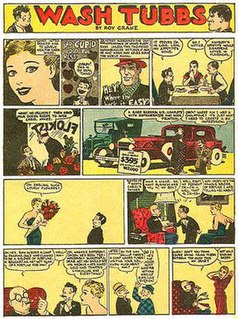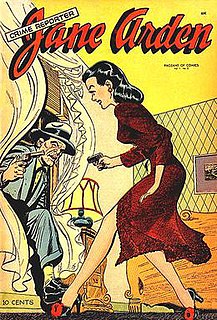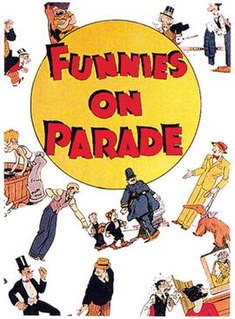
A comic strip is a sequence of drawings arranged in interrelated panels to display brief humor or form a narrative, often serialized, with text in balloons and captions. Traditionally, throughout the 20th century and into the 21st, these have been published in newspapers and magazines, with horizontal strips printed in black-and-white in daily newspapers, while Sunday newspapers offered longer sequences in special color comics sections. With the development of the internet, they began to appear online as webcomics. There were more than 200 different comic strips and daily cartoon panels in South Korea alone each day for most of the 20th century, for a total of at least 7,300,000 episodes.

Wash Tubbs was an American comic strip created by Roy Crane that ran from April 14, 1924, to 1949, when it merged into Crane's related strip Captain Easy.

Jane Arden was an internationally syndicated daily newspaper comic strip which ran from 1927 to 1968. The title character was the original "spunky girl reporter," actively seeking to infiltrate and expose criminal activity rather than just report on its consequences and served as a prototype for later characters such as Superman supporting character Lois Lane and fellow comic strip heroine Brenda Starr, Reporter. Pulitzer Prize-winning columnist Mary McGrory credited Jane Arden with instilling her interest in journalism.

The Funnies was the name of two American publications from Dell Publishing, the first of these a seminal 1920s precursor of comic books, and the second a standard 1930s comic book.

Mickey Finn was an American comic strip created by cartoonist Lank Leonard, which was syndicated to newspapers from 1936 to 1976. The successful lighthearted strip struck a balance between comedy and drama. It was adapted to a 400-page Little Big Book and was reprinted in several comic book series throughout the 1930s and 1940s.
Broom-Hilda is an American newspaper comic strip created by cartoonist Russell Myers. Distributed by Tribune Content Agency, it depicts the misadventures of a man-crazy, cigar-smoking, beer-guzzling, 1,500-year-old witch and her motley crew of friends.

Feature Funnies was an American comic book magazine published by Comic Favorites, Inc. in the United States for 20 issues from 1937 until 1939. Feature Funnies cannily mixed color reprints of popular newspaper comic strips like Joe Palooka, Mickey Finn and Dixie Dugan with a smattering of new features.
The Eastern Color Printing Company was a company that published comic books, beginning in 1933. At first it was only newspaper comic strip reprints, but later on original material was published. Eastern Color Printing was incorporated in 1928, and soon became successful by printing color newspaper sections for several New England and New York papers. Eastern is most notable for its production of Funnies on Parade and Famous Funnies, two publications that gave birth to the American comic book industry.

Dan Dunn is a fictional detective created by Norman W. Marsh. He first appeared in Detective Dan: Secret Operative No. 48, a proto-comic book from 1933, produced by Humor Publishing. He subsequently appeared in newspaper comic strips.

Funnies on Parade is an American publication of 1933 that was a precursor of comic books. The eight-page publication featured reprints of such popular syndicated comic strips as The Bungle Family, Joe Palooka, Keeping Up with the Joneses, Mutt and Jeff, Reg'lar Fellers, and Somebody's Stenog. Creators included F. O. Alexander, Gene Byrnes, Al Capp, Clare Victor Dwiggins, A. E. Hayward, C. M. Payne, Al Smith, and Harry J. Tuthill.

Famous Funnies is an American publication of the 1930s that represents what popular culture historians consider the first true American comic book, following seminal precursors.
Uncle Bill Reads the Funnies was a local Sunday morning children's television show on KAKE-TV in Wichita, Kansas, United States. The show was hosted by Bill Boyle, who would read the color comics section of the Sunday Hutchinson News.

Archie's TV Funnies is a Saturday morning cartoon animated series produced by Filmation which appeared on CBS from September 11, 1971 to September 1, 1973. The series starred Bob Montana's Archie characters.
The Amazing Spider-Man is a daily comic strip featuring the character Spider-Man. It is a dramatic, soap opera style strip with story arcs which typically run for 8 to 12 weeks. While the strip uses many of the same characters as the Spider-Man comic book, the storylines are nearly all originals and do not share the same continuity. A consistently popular strip, it has been published since 1977.
Popeye Meets the Man Who Hated Laughter, also known as The Man Who Hated Laughter, is a 1972 American animated one-hour television film that was part of The ABC Saturday Superstar Movie. This film is notable for uniting the characters from almost every newspaper comic strip then owned by King Features Syndicate in one story.

Morning Funnies is a fruit-flavored breakfast cereal produced by Ralston Cereals in 1988 and 1989. The name of the cereal was based on the assortment of newspaper comic strips featured on the box. Innovative packaging allowed the back flap of the box to be opened revealing additional comic strips, different on each edition of the cereal box. Poor sales and negative consumer reaction led to the cereal being discontinued in 1989.
The Bell Syndicate, launched in 1916 by editor-publisher John Neville Wheeler, was an American syndicate that distributed columns, fiction, feature articles and comic strips to newspapers for decades. It was located in New York City at 247 West 43rd Street and later at 229 West 43rd Street. It also reprinted comic strips in book form.

Annibelle was a comic strip created in 1929 by Dorothy Urfer. It was first published as a single panel cartoon on December 29, 1929, on the women's page of Newspaper Enterprise Association, Inc.'s Everyweek section. The humorous strip revolves around Annibelle's social life. In 1935, Annibelle began being printed in color. Virginia Krausmann took over the strip in March 1936. Annibelle comics were reprinted in The Funnies. Annibelle last ran on October 15, 1939.











